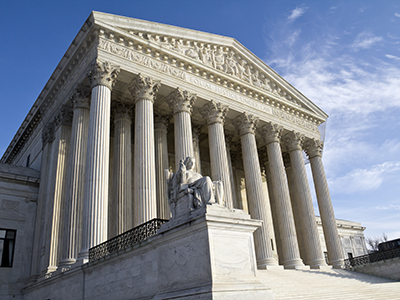
Employers across the country started the work week with some positive and long-awaited news. On Monday, May 21, 2018, the U.S. Supreme Court ruled in a landmark case that employment arbitration agreements with class action waivers do not violate federal labor law. The Court’s 5-4 decision in Epic Systems Corp. v. Lewis, No. 160285 (U.S. May 21, 2018), consolidated with Ernst & Young LLP et al v. Morris et al., No. 16-300, and National Labor Relations Board v. Murphy Oil USA, Inc., et al. , No. 16-307, was authored by Justice Gorsuch, and settles the longstanding dispute over whether arbitration agreements containing class waivers are enforceable under the Federal Arbitration Act (FAA) despite the provisions of Section 7 of the National Labor Relations Act (NLRA).
This dispute over class waivers has plagued employers since the NLRB’s 2012 decision in D.R. Horton, Inc., in which a two-member panel of the NLRB held that mandatory arbitration agreements requiring all employment disputes to be resolved through individual, bilateral arbitration violate section 8(a)(1) of the NLRA. The NLRB held that such agreements impermissibly restrict employees’ Section 7 rights to engage in “concerted action for mutual aid or protection,” notwithstanding the FAA or any Supreme Court decisions interpreting the FAA, such as Concepcion.
Since that decision, circuit courts have taken differing approaches as to how to reconcile the alleged tension between the FAA and the NLRA. The Supreme Court agreed to hear these three cases in order to resolve the circuit split on whether mandatory class action waivers violate the NLRA. In particular, the circuit split leading up to this decision broke down as follows:
- The Second, Fifth, and Eight Circuits rejected the NLRB’s position that class action waivers unlawfully interfere with employees’ NLRA rights to engage in concerted activity. See Murphy Oil USA, Inc. v. NLRB, 808 F.3d. 1013 (5th Cir. 2015); Cellular Sales of Missouri, LLC v. NLRB, 824 F.3d 772 (8th Cir. 2016); Patterson v. Raymours Furniture Co., Inc., 2016 WL 4598542 (2d Cir. Sept. 2, 2016).
- By contrast, the Sixth, Seventh, and Ninth Circuits held that an arbitration agreement precluding class actions violates the NLRA and is not preempted by the Federal Arbitration Act (“FAA”). See Morris v. Ernst & Young, 834 F. 3d 975 (9th Cir. 2016) Epic Systems Corp. v. Lewis, 823 F.3d 1147 (7th Cir. 2016); NLRB v. Alternative Entm’t, Inc., 858 F.3d 393, 401 (6th Cir. 2017). The Ninth Circuit’s opinion distinguished mandatory class action waivers from those agreements that permit employees to opt-out.
The Supreme Court resolved the conflict in the circuits by clearly ruling that there is no tension between Section 7 of the NLRA and the FAA. Rather, it held that “the Arbitration Act and the NLRA have long enjoyed separate spheres of influence and neither permits this Court to declare the parties’ agreements unlawful.” Epic Systems, No. 160285, slip op. at 2. In particular, the FAA “instruct[s] federal courts to enforce arbitration agreements according to their terms” whereas “[t]he NLRA secures to employees rights to organize unions and bargain collectively, but it says nothing about how judges and arbitrators must try legal disputes that leave the workplace and enter the courtroom or arbitral forum.” Id.
Epic Systems has several other potentially far-reaching implications:
- First, the majority narrowly interpreted the scope of the FAA’s savings clause, which can overcome the rule that arbitration agreements should be enforced as written unless the agreement violates some other provision of federal law, explaining that it applies only to defenses that truly apply to any contract, and not those “attacking (only) the individualized nature of . . . arbitration proceedings.” Slip op. at 7. It thus clarified that the reasoning of Concepcion is applicable to federal statutes—not just to defenses arising under state law. Id. at 7-8.
- Second, the decision narrowly interprets section 7 of the NLRA, reasoning that the section was drafted to protect activities such as “bargain[ing] collectively,” and thus, its protection of “other concerted activities” should be read as limited to activities that are “like the terms that precede it.” Slip op. at 12. In other words, Section 7 serves only “to protect things employees ‘just do’ for themselves in the course of exercising their right to free association in the workplace, rather than the ‘highly regulated, courtroom-bound ‘activities’ of class and joint litigation.’” at 12. The majority concludes by criticizing the dissent for “impos[ing] a vast construction on Section 7’s language.” Id. at 23.
The four liberal justices authored a strong dissent—not surprising given the political divisions over the issue, and their united front at oral argument, as we noted last November. Authored by Justice Ginsburg, the dissent focused on the history of labor law and the NLRA, and the argument that Section 7 was intended to more comprehensively protect employees’ rights—including the right to pursue collective litigation. See id. (dissent) at 3-17. It also argued for a more limited application of the FAA, and a broader application of its savings clause. Id. at 19-25. In a conflict, it argued the NLRA should control as the later-enacted law. Id. at 25-26.
Epic Systems is a clear win for employers’ right to require as a condition of employment that employees agree to individually arbitrate their disputes, rather than proceed by class action in court. Orrick will be keeping a close eye on the myriad rulings that are sure to follow this landmark case.

